There is a reason why the online business market is constantly growing and why more young entrepreneurs risk starting their own businesses.
The number of new eCommerce businesses is growing because it has never been as easy to start an online business as it is today, thanks to all of the online tools available to us, such as website builders.
Unfortunately, there is also a downside to the growing online business market. It’s the competition. Thus today, we will share some great tips that will help you successfully maximize Google Ads ROI by increasing the traffic to your website, growing the Quality Score, and applying other improvements.
Tip #1: Start With Google Ads Audit
To successfully maximize Google Ads ROI, you will need to perform a Google Ads audit first, and it can be easily done with a tool like Clever Ads. Before you start improving your website and Google Ads campaigns, it is smart to better understand where you currently stand and which parts of your ad campaigns truly need improving.
Tip #2: Make Sure Your Website Is Optimized
Before you start optimizing your Google Ads campaigns, make sure that your website is optimized. First of all, ensure that the website is easy to navigate; otherwise, you will just irritate your potential customers, and they will leave your online store.
Secondly, test the speed of the website. If you have a slow website, even the best marketing strategy will not bring you traffic and increase profits. And lastly, make your website responsive and test it out on various devices like smartphones and tablets.
Tip #3: Make Landing Pages and Ad Copy Work Together
Even if you write the best ad copy you have ever written, it will not increase your Google Ads ROI. What matters is that the expectations that are created with that ad copy are reflected on the landing page on which a potential customer will end up on.
It is best to create landing pages for your ads from scratch so that both the ad copy and the landing page are aligned perfectly. Otherwise, a website visitor will just leave your online store.
Tip #4: Work on Your Quality Score
Many different factors influence the Quality Score, one of them being the relevance between the ad copy and the landing page. The less relevant the content, the lesser the Quality Score. Also, it matters if you are posting quality content on your website.
As your spot on the first page of Google Search highly depends on the Quality Score, you should always prioritize to improve it. Because if you are not on the top of the first Google page, how will potential buyers know your business even exists?
Tip #5: Review Your Ad Groups
If you have been running Google Ads campaigns for quite some time now and only want to improve the ROI score, it is essential that you take a look at your ad groups.
Try to find such keywords that have a low Quality Score and add them to other ad groups that might give them a chance to perform better.
Tip #6: Focus on Mid-Length Keywords
When you edit or add new keywords to your ad groups, remember that keyword relevance is not the only factor that can increase your return on investment. It also matters how long the keywords are because if you choose short ones, they will likely cost you a lot of money. After all, they will be a part of some other keywords that other businesses use, therefore, very popular.
Choosing the ones that are extremely long is not a good idea as well. Too specific keywords have a small reach and do not receive a lot of attention. Therefore, it is best to pick mid-length keywords that are not too vague and not too specific.
Tip #7: Use a Wise Pay-per-Click Strategy
A good PPC strategy can go a long way, increase the traffic to your website, and grow Google Ads ROI. However, if used in an unwise manner, a pay-per-click method can lead to losing a bunch of advertising budget money.
If you have many competitors in the market, the best choice is not to pay the biggest money for the most popular keywords. The best choice is to find your difference from those other businesses and figure out keywords that will lead the potential customers specifically to you and not cost a fortune.
Tip #8: Use Negative Keywords in Your Strategy
Negative keywords are those keywords that you want to exclude when people are looking up a search term that includes keywords you are paying for. Negative keywords can help save money because people will stop seeing your ad if it’s not relevant to their needs, so you will not have to pay for their clicks.
Also, using these keywords wisely can increase your Quality Score because if your advertising is irrelevant, people will not click on it and leave your website as soon as they see the landing page.








